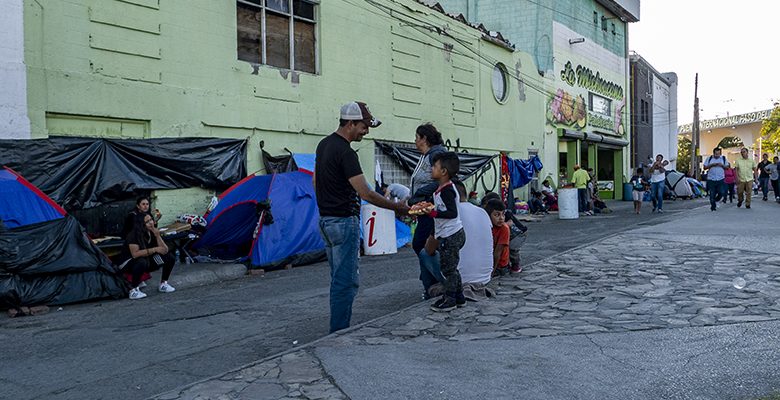Here’s a great piece by local freelance photo-journalist Henry Carver about the recently destroyed migrant tent camps in Ciudad Juarez.
“After a while you get used to sleeping on the ground outside, but it is nice to be back in a bed,” Ramón Ortega says. “We’ve suffered so much. Not just here in Juárez, not just this year with everything that happened to my father and brother. We’ve suffered all of our lives. My brothers and I started working when we were 7 or 8 … That’s when we picked up the machete to go cut down the woods to plant corn. We were so poor, there were nights we didn’t eat. I didn’t make it past primary school. I barely know how to spell my name. Life is a fight. Life is a fight until the end.”
Read the whole story at the Texas Observer.


This totally ignores the point that factories in Juarez and other parts of Mexico are hiring. They are used to working with production operators with limited education skills (and often have classes to help fix that in electronics manufacturers), zero percent unemployment in Juarez means they pay above minimum wage and Mexican law mandates so many added benefits (including an annual bonus) that hourly wages are only 1/3 of total employee compensation. Any factory with more than 25 employees must have an infirmary with at least a nurse and most bring in a doctor—many will have events that provide shots for employee families. Employees also have two meals a day in the cafeteria and in some cases, transportation to and from work. In short, these folks have options besides the US for restarting their lives away from the violence of their home region. But that doesn’t fit the open borders narrative.
Life is pretty miserable for people who work in maquilas. The minimum wage on the border is about $8 a day. The meals the maquila provides aren’t free, and neither is the transportation. The hours are long, and often include a couple of hours a day of commute. Single mothers sometimes lock their kids inside their ramshackle houses all day to keep them away from the bad influences in the neighborhoods. And not all the refugees can find work in maquilas. A subsistence farmer might not have even the minimal skills necessary for a factory job.
How bad can it be that some Mexican migrants prefer coming to the U.S. for stoop labor?
People fleeing the states of Guerrero and Michoacan are fleeing outright anarchy, and not the good kind of anarchy. Armed gangs are driving them from their farms and homes and kidnapping their sons to force them into work as assassins or working in drug labs.
With the kind of spin you’re dealing, you should get a job with the City. They could use the help.
I worked in one of those maquilas for four years. Working conditions are good and the factory regularly hired folks with marginal education skills. We actually hired many of the subsistence farmers that came up in annual Central American migrations and had training programs and visual work instructions that were set up for folks with literacy issues (that isn’t done in the US anymore). That company even had a partnership with the state of Chihuahua that that provided high school classes for employees who had dropped out earlier in life to go to work. We also had tuition refund programs for college. Many of the Mexican managers and engineers had gotten their degrees and training through the maquila system. Some came from families where neither of their parents had completed elementary school. Maquilas have changed lives. You are correct that meals and transportation are not free but they are significantly discounted (if I remember correctly the food debit was something like 50 cents a meal). And no one pays minimum wage—they all pay higher than that. The reason folks want to come to the US is because they are being lied to—they don’t understand the costs of immigration, the bite taxes take out of a paycheck or the skills level required for higher paying jobs. They are imagining the wage levels they hear quoted with the expense levels they know from Mexico and see that as huge wealth. They actually have better opportunities for upward mobility in a maquila and a lower cost of living, plus access to free healthcare as long as they are employed.
Thank you for sharing your informed opinion. I defer to your expertise.